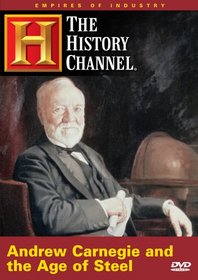| Genres: Television, Documentary Sub-Genres: Television, Documentary Studio: A&E Home Video Format: DVD - Color - Closed-captioned DVD Release Date: 12/27/2005 Original Release Date: 01/01/2005 Theatrical Release Date: 01/01/2005 Release Year: 2005 Run Time: 0hr 50min Screens: Color Number of Discs: 1 SwapaDVD Credits: 1 Total Copies: 0 Members Wishing: 4 MPAA Rating: NR (Not Rated) Languages: English |
Search - Empires of Industry - Andrew Carnegie and the Age of Steel (History Channel) on DVD
  | Empires of Industry - Andrew Carnegie and the Age of Steel History Channel Genres: Television, Documentary NR 2005 0hr 50min America is built on a steel skeleton. Without Andrew Carnegie, that skeleton-and the nation-might have taken a different form. Andrew Carnegie and the Age of Steel visits historic ironworks-namely Saugus and Hopewell-as we... more » |
Larger Image |
Movie DetailsSimilar Movies
Similarly Requested DVDs
|
Movie ReviewsSteel, Steel, and Mo' Steel! Jeffery Mingo | Homewood, IL USA | 09/15/2006 (1 out of 5 stars) "Instead of being named "AC and the Age of Steel," it should have been named "The Age of Steel with Andrew Carnegie." This documentary is more about steel than this famous rich guy. They don't even bring up Carnegie until one-fifth of the way into the work. They show about two photos of him and that's all. You never learn if he went to college, what charities he supported, or how he died. They show a photo of Carnegie with a man I believe to be Booker T. Washington. Did Carnegie support Black colleges or other African-American causes of the time? This work never answers: all it does is focus on steel. I can't believe that the History Channel actually thought a marketable number of people would want to know about that. Leave that boring stuff in an engineering classroom! I liked that the interviewees came from a diverse range of universities in the South and North. I hate that I'm buying into ideas that only "great men" are worthy of historical works. But still, yawn! I was left very disappointed." Not Closed captioned Mark G. Dodge | Hollis, NH | 08/08/2007 (4 out of 5 stars) "This was supposed to be closed captioned and it was not -- It is hardly worth the bother to send it back and try to get the correct one. It is however, a good presentation of the rise of the steel industry, I use it in my classroom." Steel Yorself for a Boring Ride David N. Buckley | Birmingham, MI | 04/03/2010 (2 out of 5 stars) "Despite its title this video is not about either the Age of Steel or Andrew Carnegie. It is instead intended to be a quick and breezy romp through the history of a major American industry. Because it aims to entertain rather than educate, it does neither successfully. If (like me) you bought this for use in the classroom, be warned: it is a powerful soporific! It'll only work if you provide questions in advance, and ask students to watch with an eye to finding answers. (I'd strongly recommend that you NOT use the idiotic "questions" supplied by the History Channel. They are useless!)
The opening section on the creation of colonial iron works at Saugus (Mass) and Cornwell and Hopewell (Pa) is informative and useful. The section on Carnegie, titled "Genius", is too sycophantic for my tastes. You'd get the impression from looking at this that Carnegie personally produced the steel himself, and that "his" over-worked and grossly underpaid workers were just there to enjoy the scenery. This glorification of business types is the stock in trade of the video-education world, run as it is by people who have no respect for the human intellect. A pity really, since much could be learned by the viewer if the emphasis had been put (where it deserves to be) on the technology. The ONLY major process dealt with here is the Bessemer process. It is poorly explained. Nothing is said about Siemens Martin processing, or about the Gilchrist Thomas method that solved the problem of heavy phosphor ores. (None of this is as "difficult" as it sounds; and ALL of it should really be treated in this video). In the next section, The Steel Workers are given a cameo role in the Big Strike -- Homestead, 1892. This video doesn't provide enough information on organized labor or its valid grievances against corporate plunder for students to be able to learn anything of any worth. A pity, really, given that only an honest presentation of the facts will produce intelligent discussion. But, video producers don't aim to spark discussion. They aim to numb the intellect with idiotic narration and annoying muzak. There's a penultimate section on "merging" which covers Carnegie's decision to sell out to J.P. Morgan. Here too the viewer learns too little for it to be of much use. The concluding section on "Rebirth" is the usual unconvincing drivel about America's renewed "competitiveness". There's no real attempt to explain why American steel failed to compete against the innovations in steel making that emerged in Europe and Japan after WWII. Nor is there even a mention of Brazil's Mini Mills which almost single-handedly humbled the once mighty and over-bearing U.S. Steel. The video claims that those foreigners are cheating, and of course American business never "cheats", so here too the viewer is treated like a numbskull. If you learn anything from this video, it'll only be by accident. Its values are "commercial" not educational. And the results are predictable: American edutainment continues to produce comfortable numb "history buffs."" |














